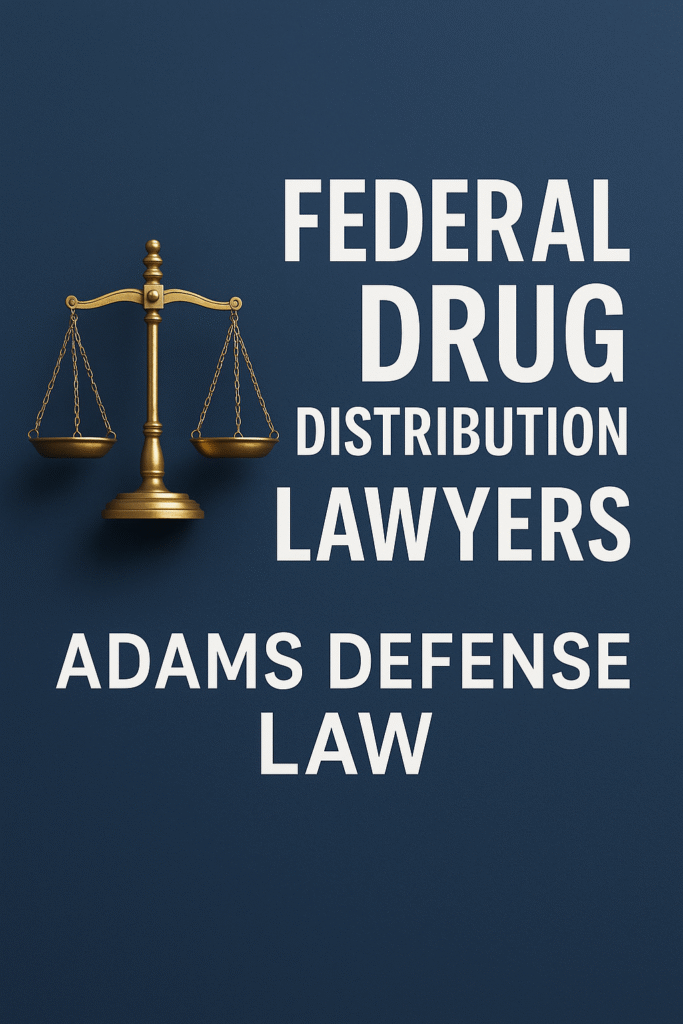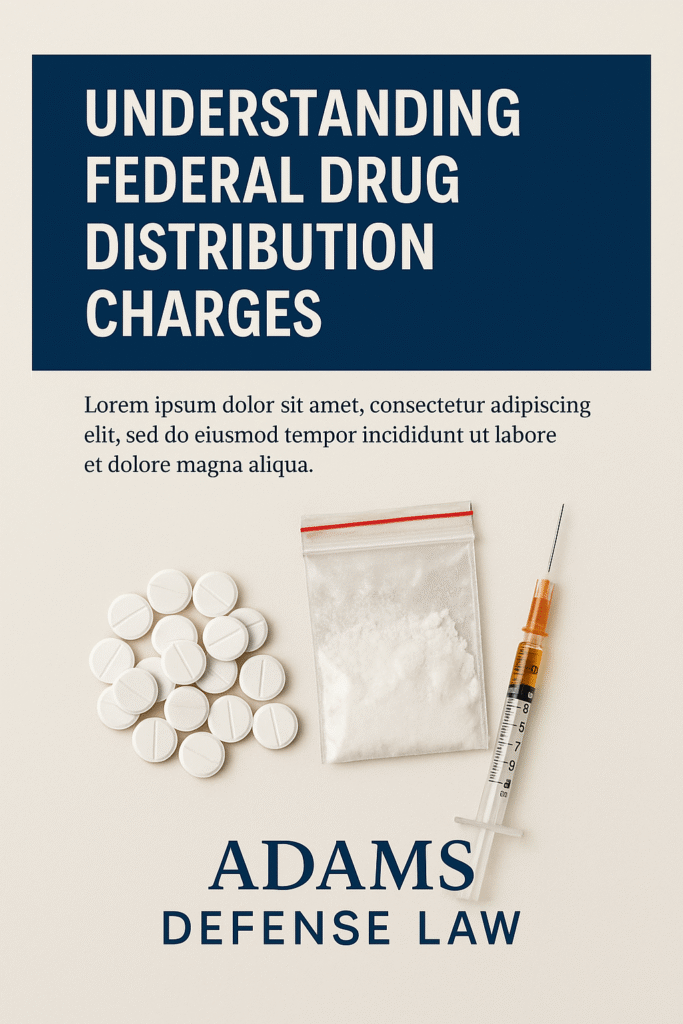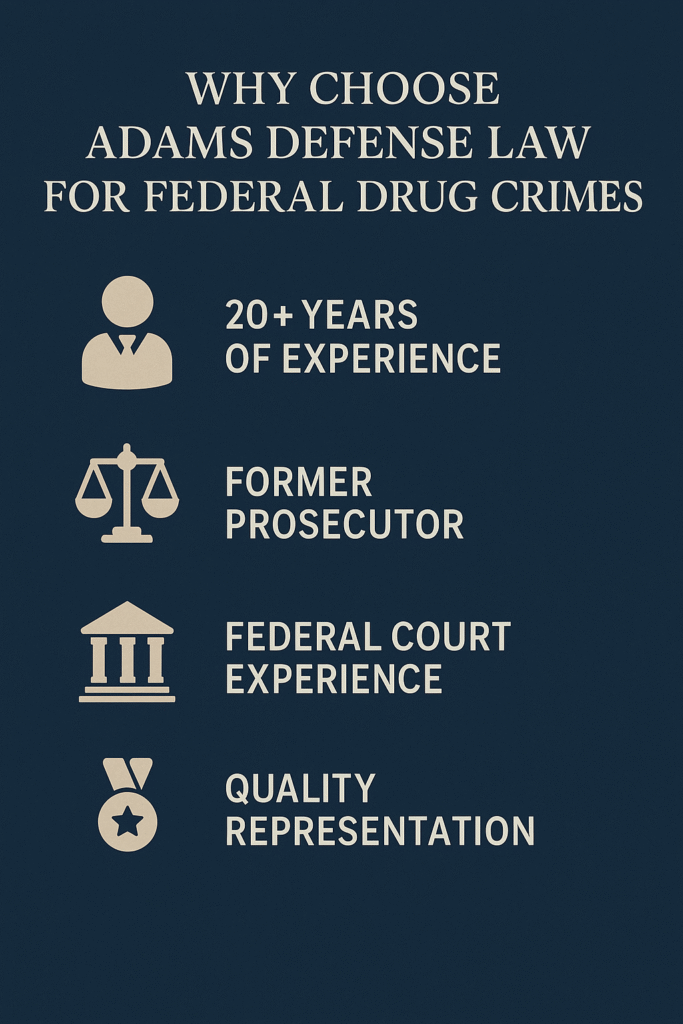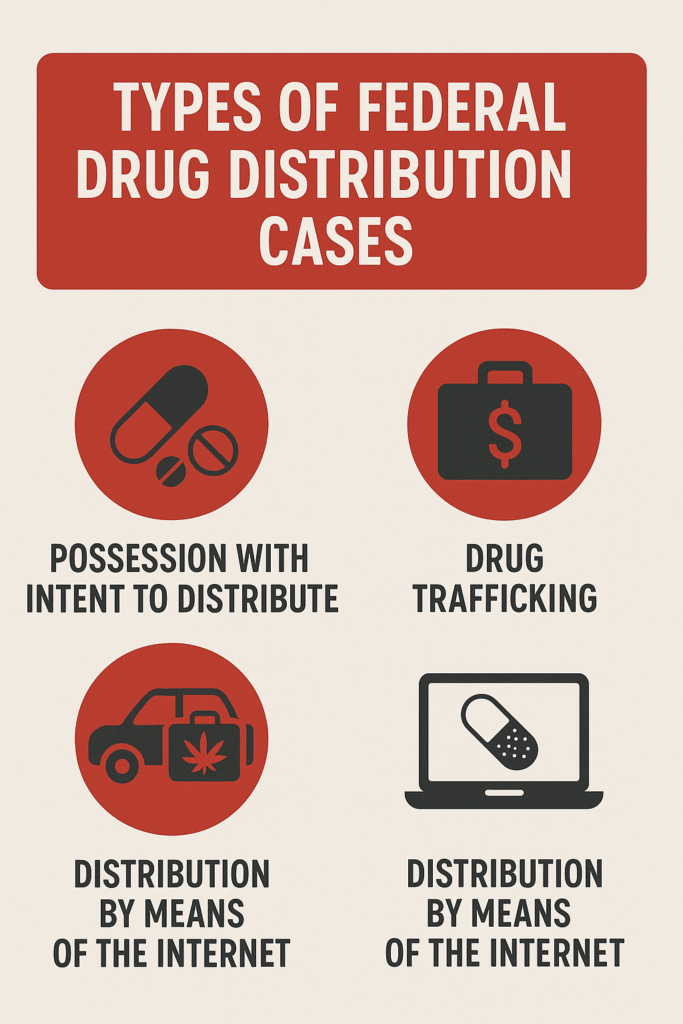Federal Drug Distribution Law
Federal Drug Distribution Attorney | Chicago, NYC, Kansas City
Experienced federal criminal defense lawyer providing aggressive representation for drug distribution charges, focusing on intent to distribute defenses and quantity threshold challenges.
Federal drug distribution charges carry severe penalties and often hinge on the government’s ability to prove “intent to distribute” rather than simple possession. These cases frequently involve complex legal questions about drug quantities, circumstantial evidence, and the distinction between personal use and commercial distribution. When facing federal distribution charges, you need an attorney who understands these nuances and can effectively challenge the government’s evidence.
Attorney Josh Adams at Adams Defense Law has successfully defended clients against federal drug distribution charges in Chicago, New York City, and Kansas City federal courts. Our approach focuses on challenging the government’s intent evidence, questioning quantity calculations, and protecting your constitutional rights throughout the federal criminal process.
Call (312) 566-9173 for immediate consultation or complete our confidential case evaluation to discuss your federal distribution charges.


Understanding Federal Drug Distribution Charges
Federal drug distribution is prosecuted under 21 U.S.C. § 841(a)(1), which prohibits the manufacture, distribution, dispensing, or possession with intent to manufacture, distribute, or dispense controlled substances. Unlike simple possession, distribution charges focus on the defendant’s intent to transfer drugs to others, whether for profit or not.
The government can prove distribution through two primary methods:
Actual Distribution: Evidence of actual sales, transfers, or deliveries of controlled substances to other persons.
Possession with Intent to Distribute: Possession of drugs under circumstances indicating intent to distribute, even without proof of actual distribution activities.
Key Elements of Federal Distribution Charges
To secure a distribution conviction, federal prosecutors must prove beyond a reasonable doubt:
Knowledge: The defendant knew they possessed a controlled substance and knew the general nature of the substance.
Intent: The defendant intended to distribute the controlled substance to another person.
Federal Jurisdiction: The offense occurred in or affected interstate commerce, which is typically easy for prosecutors to establish.
Drug Identity and Quantity: The substance is a federally controlled substance, and the government must prove specific quantities for sentencing purposes.
Intent to Distribute: The Critical Element
Intent to distribute is often the most contested element in federal distribution cases. The government typically proves intent through circumstantial evidence including:
Drug Quantity: Large amounts of drugs that exceed typical personal use quantities suggest distribution intent.
Packaging and Bagging: Multiple small packages, individual baggies, or distribution-sized portions indicate sales activity.
Paraphernalia: Scales, cutting agents, packaging materials, and other drug distribution tools suggest commercial activity.
Cash and Financial Evidence: Large amounts of cash, particularly in small bills, or evidence of drug-related financial transactions.
Communication Evidence: Text messages, phone calls, or other communications discussing drug sales or distribution activities.
Surveillance Evidence: Observed meetings, exchanges, or other conduct consistent with drug distribution.
Types of Federal Drug Distribution Cases
Possession with Intent to Distribute
The majority of federal distribution cases are charged as “possession with intent to distribute” rather than actual distribution. These cases rely heavily on circumstantial evidence to prove the defendant’s intent.
Common Scenarios:
- Traffic stops revealing large drug quantities with distribution paraphernalia
- Search warrants executing at residences with packaged drugs and scales
- Mail interception cases involving drugs shipped through postal services
- Airport arrests with drugs packaged for distribution
Defense Strategies:
- Challenging quantity calculations and purity determinations
- Providing alternative explanations for paraphernalia and packaging
- Arguing personal use rather than distribution intent
- Questioning search and seizure procedures
Actual Distribution Charges
Actual distribution cases involve evidence of completed drug transfers, often through undercover operations, controlled purchases, or surveillance evidence.
Typical Evidence:
- Undercover officer purchases or controlled buys by confidential informants
- Surveillance recordings of drug transactions
- Witness testimony regarding drug purchases
- Financial records showing drug sales proceeds
Defense Approaches:
- Challenging the reliability and credibility of government witnesses
- Questioning law enforcement procedures and constitutional compliance
- Examining entrapment and government inducement issues
- Disputing the identity and quantity of substances involved
Distribution Network Cases
These cases involve allegations that defendants participated in larger drug distribution operations, often charged alongside conspiracy counts.
Common Elements:
- Multiple defendants with different roles in distribution network
- Allegations of supplier, distributor, and street-level dealer relationships
- Evidence of coordinated distribution activities over extended periods
- Financial evidence showing proceeds from distribution operations
Defense Considerations:
- Distinguishing client’s role and level of involvement
- Challenging the scope and existence of alleged distribution network
- Questioning evidence linking defendant to network activities
- Addressing potential conflicts with co-defendant interests
Interstate Distribution
Interstate distribution cases involve drug movement across state lines and often carry enhanced penalties due to federal jurisdictional concerns.
Jurisdictional Elements:
- Transportation of drugs between states
- Use of interstate commerce facilities (mail, shipping, internet)
- Distribution networks spanning multiple states
- Connection to interstate drug trafficking organizations
Defense Focus:
- Challenging federal jurisdiction and venue
- Questioning interstate commerce connections
- Examining search and seizure issues in multi-state investigations
- Coordinating defense across multiple jurisdictions when necessary
Federal Distribution Penalties and Sentencing
Federal drug distribution penalties vary significantly based on drug type, quantity, and defendant’s criminal history. Understanding these penalties is crucial for developing effective defense strategies.
Quantity-Based Mandatory Minimums
Federal distribution sentences often depend on specific drug quantities that trigger mandatory minimum sentences:
Cocaine Distribution:
- 500 grams or more: 5-year mandatory minimum
- 5 kilograms or more: 10-year mandatory minimum
Crack Cocaine Distribution:
- 28 grams or more: 5-year mandatory minimum
- 280 grams or more: 10-year mandatory minimum
Heroin Distribution:
- 100 grams or more: 5-year mandatory minimum
- 1 kilogram or more: 10-year mandatory minimum
Methamphetamine Distribution:
- 50 grams pure or 500 grams mixture: 5-year mandatory minimum
- 500 grams pure or 5 kilograms mixture: 10-year mandatory minimum
Fentanyl Distribution:
- 40 grams or more: 5-year mandatory minimum
- 400 grams or more: 10-year mandatory minimum
Sentencing Enhancements
Several factors can increase federal distribution sentences:
Prior Drug Felonies: Defendants with prior serious drug felony convictions face doubled mandatory minimums.
Firearms Involvement: Possession or use of firearms during distribution offenses adds consecutive mandatory sentences.
Distribution Near Schools or Playgrounds: Enhanced penalties apply for distribution within 1,000 feet of schools or playgrounds.
Distribution to Minors: Additional penalties for distributing drugs to persons under 21 years old.
Leadership Role: Sentences increase for defendants who played leadership or management roles in distribution operations.
Defense Strategies for Distribution Cases
Effective defense of federal distribution charges requires comprehensive strategies addressing both factual and legal challenges to the government’s case.
Challenging Intent to Distribute Evidence
Personal Use Defense: One of the most effective defenses challenges the government’s evidence of distribution intent:
- Demonstrating drug quantities consistent with personal use rather than distribution
- Providing evidence of defendant’s personal drug use patterns and tolerance
- Challenging assumptions about typical user quantities versus dealer amounts
- Presenting expert testimony about drug use patterns and personal consumption
Alternative Explanations for Physical Evidence:
- Explaining scales and packaging materials for non-drug purposes
- Challenging assumptions about cash sources and legitimate income
- Providing innocent explanations for drug-related paraphernalia
- Demonstrating legal reasons for communication evidence
Constitutional Challenges
Fourth Amendment Violations: Many distribution cases begin with searches that may violate constitutional protections:
- Challenging traffic stop justification and duration
- Questioning consent to search validity and scope
- Examining search warrant applications for accuracy and probable cause
- Investigating GPS tracking and surveillance constitutional compliance
Fifth Amendment Issues: Distribution investigations often involve interrogations and statements that may violate constitutional rights:
- Suppressing unwarned custodial interrogation statements
- Challenging coercive interrogation techniques and environments
- Protecting grand jury testimony and immunity issues
- Examining plea negotiation statements and admissions
Challenging Drug Evidence
Quantity and Purity Challenges: Accurate drug quantity determination is crucial for avoiding mandatory minimum sentences:
- Obtaining independent laboratory analysis of seized substances
- Challenging cutting agents and adulterants in weight calculations
- Questioning field test accuracy and laboratory procedures
- Examining chain of custody for drug evidence
Drug Identity Issues:
- Challenging government chemist qualifications and testing procedures
- Questioning contamination and sample integrity issues
- Examining laboratory accreditation and quality control procedures
- Presenting alternative explanations for substance identity
Surveillance and Communication Evidence
Electronic Surveillance Challenges:
- Examining wiretap authorization procedures and minimization compliance
- Challenging cell phone searches and data extraction procedures
- Questioning GPS tracking authorization and constitutional requirements
- Investigating social media and internet surveillance issues
Confidential Informant Issues:
- Challenging informant reliability and motivation
- Examining informant control and supervision by law enforcement
- Questioning controlled purchase procedures and authenticity
- Investigating potential entrapment and government inducement
Quantity Thresholds and Drug Categories
Understanding how federal law categorizes drugs and establishes quantity thresholds is essential for distribution defense.
Schedule I Substances
Heroin: Highly addictive with no accepted medical use
- Distribution thresholds: 100g (5-year minimum), 1kg (10-year minimum)
- Common defense issues: purity calculations, cutting agents
LSD: Hallucinogenic substance with severe penalties
- Distribution thresholds: 1g (5-year minimum), 10g (10-year minimum)
- Common defense issues: carrier weight calculations, testing accuracy
MDMA/Ecstasy: Popular party drug with harsh federal penalties
- Distribution thresholds: 400 pills or 100g (5-year minimum)
- Common defense issues: pill weight versus pure substance calculations
Schedule II Substances
Cocaine: Powder cocaine with significant mandatory minimums
- Distribution thresholds: 500g (5-year minimum), 5kg (10-year minimum)
- Common defense issues: purity levels, cutting agent weight
Methamphetamine: Highly addictive stimulant with severe penalties
- Distribution thresholds: 50g pure (5-year minimum), 500g pure (10-year minimum)
- Common defense issues: pure versus mixture weight calculations
Fentanyl: Extremely potent opioid with low quantity thresholds
- Distribution thresholds: 40g (5-year minimum), 400g (10-year minimum)
- Common defense issues: analog identification, potency calculations
Prescription Drug Distribution
Oxycodone, Hydrocodone, Fentanyl: Legitimate medications when prescribed
- Distribution issues: prescription validity, doctor shopping allegations
- Common defenses: legitimate medical need, prescription compliance
Working with Adams Defense Law
Immediate Case Response
When you contact Adams Defense Law about federal distribution charges, we immediately begin protecting your rights:
Emergency Consultation: We provide comprehensive case evaluation, explaining charges, penalties, and available defense options.
Evidence Analysis: Our team immediately examines arrest reports, search warrants, and initial evidence to identify constitutional violations and defense opportunities.
Investigation Launch: We begin independent investigation while evidence is fresh and witnesses are available.
Comprehensive Defense Development
Expert Witness Coordination: We work with chemists, former DEA agents, and drug use experts who can challenge the government’s evidence and provide alternative explanations.
Scientific Analysis: We obtain independent laboratory analysis of drug evidence to challenge government quantity and purity determinations.
Constitutional Motion Practice: We file comprehensive pretrial motions challenging searches, seizures, and other constitutional violations.
Trial Preparation and Advocacy
Jury Education: We effectively communicate complex drug law concepts to jurors, helping them understand the government’s burden of proof.
Cross-Examination Strategy: Our trial experience allows us to effectively challenge government witnesses, including law enforcement officers and cooperating defendants.
Defense Presentation: We present compelling defenses that challenge intent evidence and provide alternative explanations for the government’s case.
Related Federal Drug Defense Services
Our distribution defense practice connects with our comprehensive federal drug crime representation:
Federal Drug Crimes Overview → – Understanding how distribution charges fit within broader federal drug enforcement strategies.
Federal Drug Trafficking Defense → – Many distribution cases escalate to trafficking charges requiring coordinated defense approaches.
Federal Drug Conspiracy Defense → – Distribution cases often include conspiracy allegations requiring specialized multi-defendant defense strategies.
Federal Drug Manufacturing Defense → – Distribution cases may involve manufacturing allegations requiring technical expertise and specialized defenses.
Connection to State Drug Defense
Our federal distribution defense builds on extensive experience with related state charges:
Chicago Drug Defense → – Understanding how state distribution investigations can escalate to federal prosecution.
Federal Sentencing Considerations
Safety Valve Provisions
First-time, non-violent drug offenders may qualify for safety valve relief from mandatory minimum sentences:
Requirements:
- No more than one criminal history point
- No violence or firearm use in the offense
- No death or serious injury resulting from offense
- Defendant was not leader or organizer
- Complete truthfulness with government about offense
Substantial Assistance Departures
Defendants who provide substantial assistance in prosecuting other offenders may receive significant sentence reductions:
Considerations:
- Significance and usefulness of assistance provided
- Nature and extent of assistance
- Truthfulness and completeness of information
- Risk and dangerousness to defendant from cooperation
Time-Sensitive Defense Actions
Federal distribution charges require immediate attention to preserve defense options:
Detention Hearings: Many distribution defendants face pretrial detention based on flight risk or danger to community allegations.
Preservation of Evidence: Critical evidence may be lost without immediate action to preserve it through proper legal procedures.
Witness Interviews: Speaking with potential witnesses early, before government contact, can be crucial for building effective defense strategies.
Laboratory Analysis: Independent analysis of drug evidence must be arranged quickly to challenge government quantity and purity determinations.
Protect Your Future: Contact Adams Defense Law Today
Federal drug distribution charges can result in lengthy prison sentences and permanent consequences for your future. Don’t face these serious charges without experienced federal criminal defense representation.
Get immediate help:
- Call (312) 566-9173 for urgent consultation
- Complete our confidential case evaluation for detailed case analysis
Attorney Josh Adams provides aggressive federal distribution defense in Chicago, New York City, Kansas City, and federal courts nationwide. We’re available 24/7 for criminal defense emergencies and understand the time-sensitive nature of federal drug cases.
Don’t wait – contact us immediately to begin protecting your rights and building your defense against federal distribution charges.
This information is provided for educational purposes and does not constitute legal advice. Federal drug distribution cases involve complex legal issues requiring individualized analysis. Case outcomes depend on specific facts and circumstances.
Why Choose Adams Defense Law for Federal Drug Crimes
Proven Federal Court Experience
Attorney Josh Adams has extensive experience defending clients in federal court across multiple jurisdictions. This experience is crucial when facing the complex procedural and substantive challenges of federal drug prosecutions.
Multi-Jurisdictional Practice
With active practice in Chicago, New York City, and Kansas City federal courts, Adams Defense Law can provide consistent representation regardless of where your case is being prosecuted.
Comprehensive Case Investigation
We conduct thorough investigations of every case, including:
- Independent forensic analysis
- Expert witness consultation
- Investigation of law enforcement procedures
- Discovery of exculpatory evidence
Client-Centered Approach
We understand that federal drug charges can devastate individuals and families. Our approach focuses on:
- Clear communication throughout the process
- Realistic assessment of case strengths and weaknesses
- Exploration of all available defense options
- Preparation for trial when necessary

Contact Federal Drug Lawyers
Contact Our Federal Criminal Defense Attorney
If you’re facing federal charges or under federal investigation in Chicago, New York City, or Kansas City, time is critical. Federal cases move quickly once charges are filed, and early intervention can significantly impact your case outcome.
Call (312) 566-9173 for immediate consultation
Available 24/7 for:
- Federal arrests and detention hearings
- Grand jury subpoenas and target letters
- Federal search warrants
- Emergency federal court matters
Office Locations:
Chicago Office (Primary) Adams Defense Law
(312) 566-9173 info@adamsdefenselaw.com
Free Consultation: All federal criminal defense consultations are confidential and protected by attorney-client privilege.
Get Your Free Criminal Case Evaluation
Disclaimer: This website provides general information about federal criminal defense. It does not constitute legal advice and does not create an attorney-client relationship. Federal criminal cases are complex and fact-specific. Consult with an experienced federal criminal defense attorney for advice about your specific situation


